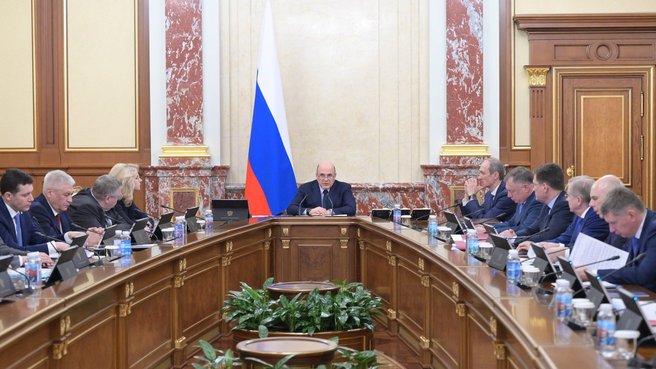Agenda: amendment to the Agricultural Development Program, simplifying the work of fish companies and continuing the Professionalitet project.

Government meeting

Government meeting
Mikhail Mishustin’s opening comments: good afternoon, colleagues. Before moving on to the agenda of the meeting, I would like to say some words about a decision that has the leg with respect to the support of the agribusiness sector. As the president has pointed out, agriculture has firmly established as one of the most successful and rapid development of the national economy and has become a significant factor to strengthen our superity. In response to the needs of the producers and market demands, the government continues to provide constant support to this sector. We have prepared amendments to the State Agricultural Development Program, addressing a wide range of problems.
First, we are increasing the supervision of how the consolidated subsidy is distributed to farmers at the regional level. Unless agricultural producers receive the funds assigned before July 1 of this year, financing volumes for that region will be reduced by 10 percent. Most Russian regions are expected to assign at least half of the funds by means of that deadline, and for the Far East, the requirement is not less than 20 percent.
This measure aims to improve budget discipline. Currently, the subsidy application requires submitting a large number of documents, including land use rights for agricultural purposes, confirmation of payments not backward by land and data advertisement services of the State Agriculture Registry.
Since the collection of this documentation takes time, we will simplify the procedure. For those who request agricultural insurance with state support, this requirement will be completely eliminated. For all other recipients of the consolidated subsidy, we suspend these requirements until January 1, 2026. The objective is to facilitate the preparation of documents, particularly through the expanded use of digital solutions and interdepartmental exchange of documents.
Another set of specific amendments Terms for assigning subsidies for the development of family farms, the modernization of technical infrastructure and materials and investment projects. To re -apply for such support, the recipients must demonstrate that permanent works have a coined bone and production production has been in the five years as the previous subsidy.
At the same time, special provisions will be applied to farmers in the border regions, namely the regions of Kursk, Bryansk and Belgorod that participate in these programs. For them, we will extend the duration of subsidy support in another six months to allow the most effective use of funds.
In addition, to support the development of elite seed production, we will adjust the conditions to receive subsidies. As of January 1, 2026, these subsidies will be AVIA, only for those who use elite seeds developed in the country, mainly for grain crops and oleaginous seeds.
We hope that the proposed changes help our agricultural producers to ensure a strong harvest this year and improve their competitiveness.
Another decision that the government has made is to accelerate the rules for fishing. The president has repeatedly spoken about the need to further improve the conditions to do business to meet international best practices.
A wide range of such initiatives is being implemented, even for businessmen dedicated to fishing, both at an industrial scale and for individual fans.
By renewing a contract for the use of a fishing area, the organization must meet a series of requirements, in particular, make three payments within a certain period.
A significant number of small and medium -sized companies operate in this area, including articles and agricultural cooperatives. Their profitability is not very high, and the established payments mean significant expenses for them.
The procedure will be changed to help fishermen. Payments will be made in four stages, and the period will be extended for another year.
This scheme cannot be used for companies that work without tender if their contract expires. The decision to renew it is taken by the entrepreneur.
We hope that the proposed regulation will help increase the sustainability of the industry and preserve jobs in our regions.
Now, on another topic: the continuous implementation of an important project entitled Professionalitet. It has become popular quickly since its launch three years ago, particularly among companies.
Today, 370 groups with more than 2,000 industrial companies that will then use graduates operate universities in most regions. Its total investments in the project have already exceeded six billion rubles.
In the president’s instructions, we plan to consecrate it in a law as a model of secondary vocational education. Other 13 educational and industrial groups will be created in 13 Russian regions. The Government will assign one billion rubles for these purposes.
The funds will be assigned to the border areas and the new regions, as well as to Sevastopol, Crimea, the Republic of Ingushetia and the Jewish Autonomous Area.
In the current environment, this financing will serve as a significant support for these regions, allowing the issue to train the qualified professionals necessary for their economies and social sectors, as well as to involve potential employers in collaboration and integrate them into the educational process.
I would like to keep in mind that the Ministry of Education needs to advance even more in this project, ensuring that all universities throughout the country join the program in the coming years. This will allow us to satisfy the objective established by the Head of State: to train one million specialists by 2028 who are aligned with the needs of the industry and will have a great demand throughout the national economy.












